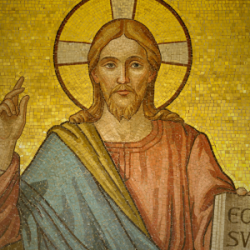
When Sinner Only Means Different
As we continue our consideration, William Herzog shares how “sinner” was assigned in the context of grain purchasing and consumption in Jesus’ society:
“According to Leviticus 11:38 if water is poured upon seed it becomes unclean. The passage, however, does not distinguish between seed planted in the soil and seed detached from the soil . . . In years of poor harvests, a frequent occurrence owing to the poor soil, drought, warfare, locust plaques and poor methods of farming, this text was a source of dispute. Why? During such lean years, grain was imported from Egypt. But the Egyptians irrigated their fields (putting water on seed) so their grain was suspect, perhaps even unclean. The Sadducees judged that such grain was unclean and anyone consuming it also became unclean. They were quite willing to pay skyrocketing prices commanded by the scarce domestic grain because they could afford it . . . One senses economic advantage being sanctioned, since the Sadducees were often large landowners whose crops increased in value during such times. By contrast, the Pharisees argued that the Pentateuchal ordinance applied only to seed detached from soil [before being planted]; therefore . . . one could be observant and still purchase Egyptian grain.” (In Ched Myers’ book Binding the Strong Man)
Part 2 of We Won’t Be Great Until Everyone Is Great
Welcome Readers! Please subscribe to Social Jesus Here.
(Read this series from its beginning here.)
A Gospel For Those Marginalized
Those who could not afford to live up to the Sadducees’ interpretation were labeled as sinners and that effectively marginalized them and their voice in their society. The Sadducees’ position was financially advantageous to them. It also kept them centered in their community as more righteous than others because they could afford a more expensive definition of “righteous” behavior.
By contrast, the Pharisees’ position that buying Egyptian grain didn’t make one unclean was more liberal and would have been more popular among working-class people in Jesus’ society. Jesus went even further than the Pharisees with a gospel for the working class who could not afford the more expensive domestic grain of the Sadducees and for the poor who could not afford the cheaper imported, irrigated Egyptian grain either. In this sense, Jesus’ gospel for the poor was also a gospel for those marginalized with the label “sinner”.
Simply Economically Exploited
But in reality, these “sinners” were not less moral. They were simply less affluent. Applying the term sinner to the poor gave them a lesser moral value and meant those who had more means could afford to practice a more costly definition of righteousness. This impacted the working class too, even though their social status would have been marginally above the poor. What we can’t miss here is that people weren’t morally inferior, they were simply economically exploited, and moral value (or the lack of it) was then heaped on top of their economic plight. All of this kept wealthy property owners centered in the various political, social and economic systems of their day. In Jesus’ gospel of economic justice, his work would have most definitely attracted those the more wealthy had labeled or mislabelled as “sinner.”
Today Christians do the same thing. We pick something that triggers our own bigotry and attach moral value to it, describing it as sinful when intrinsically there really is nothing harmful or “wrong” involved and we are simply triggered by someone being different than ourselves. We’ll pick up there, in Part 3.
Are you receiving all of RHM’s free resources each week?
Begin each day being inspired toward love, compassion, justice and action. Free.
Sign up at HERE.


















